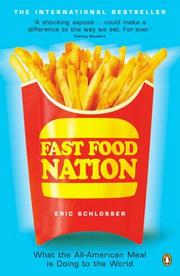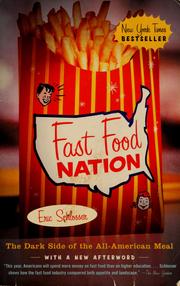Map
Year: 1995 Publisher: Berchem s.l. Alain van Lidth Quick restaurants
Abstract | Keywords | Export | Availability | Bookmark
 Loading...
Loading...Choose an application
- Reference Manager
- EndNote
- RefWorks (Direct export to RefWorks)
Advertising --- Fast food restaurants --- Belgium --- Belgium --- Cartes
Map
Year: 1995 Publisher: Berchem S.l. van Lidth, Alain Quick restaurants
Abstract | Keywords | Export | Availability | Bookmark
 Loading...
Loading...Choose an application
- Reference Manager
- EndNote
- RefWorks (Direct export to RefWorks)
Advertising --- Fast food restaurants --- Belgium --- Belgium --- Cartes
Book
ISBN: 1134597622 1134597630 1280137932 0203005775 Year: 2002 Publisher: London : Routledge,
Abstract | Keywords | Export | Availability | Bookmark
 Loading...
Loading...Choose an application
- Reference Manager
- EndNote
- RefWorks (Direct export to RefWorks)
The fast-food industry is one of the few industries that can be described as truly global, not least in terms of employment, which is estimated at around ten million people worldwide. This edited volume is the first of its kind, providing an analysis of labour relations in this significant industry focusing on multinational corporations and large national companies in ten countries: the USA, Canada, the UK, the Netherlands, Germany, Australia, New Zealand, Singapore, and Russia.The extent to which multinational enterprises impose or adapt their employment practices in differing national in
Chain restaurants. --- Employees. --- Fast food restaurants. --- Fast food restaurants - Employees - Labor unions -. --- Industrial relations. --- Industrial relations --- Fast food restaurants --- Chain restaurants --- Employees --- Labor unions
Book
ISBN: 9781544398013 1544398018 Year: 2021 Publisher: Thousand Oaks: Sage,
Abstract | Keywords | Export | Availability | Bookmark
 Loading...
Loading...Choose an application
- Reference Manager
- EndNote
- RefWorks (Direct export to RefWorks)
"The McDonaldization of Society is George Ritzer's seminal work of critical sociology that updates and applies Max Weber's rationalization thesis to the the late 20th and early 21st century. The central premise of McDonaldization is that the fast food restaurant has become the model for the rationalization process today, creating a system of operation based on efficiency, calculability, predictability, and control that has been adopted across a wide ranges of businesses, organizations, and social institutions"--
Social structure --- Management --- Fast food restaurants --- Rationalization (Psychology) --- United States
Book
Year: 2003 Publisher: Paris: Autrement,
Abstract | Keywords | Export | Availability | Bookmark
 Loading...
Loading...Choose an application
- Reference Manager
- EndNote
- RefWorks (Direct export to RefWorks)
Fast food restaurants --- Food industry and trade --- Convenience foods

ISBN: 9780141006871 Year: 2002 Publisher: London Penguin Books
Abstract | Keywords | Export | Availability | Bookmark
 Loading...
Loading...Choose an application
- Reference Manager
- EndNote
- RefWorks (Direct export to RefWorks)
Economic order --- Nutritionary hygiene. Diet --- Housekeeping --- fast food
Book
ISBN: 9783515129138 3515129138 Year: 2021 Publisher: Stuttgart Franz Steiner Verlag
Abstract | Keywords | Export | Availability | Bookmark
 Loading...
Loading...Choose an application
- Reference Manager
- EndNote
- RefWorks (Direct export to RefWorks)
Bis in die Mitte des 19. Jahrhunderts war Fast Food eine ungewollte Notwendigkeit der breiten Bevolkerung, die sich keine aufwendige Kuche leisten konnte. Als das Burgertum zur vorherrschenden Gesellschaftsschicht wurde, wurden mehrgangige Menus und Restaurants mit Speisen a la carte zum Standard, an dem sich spater auch die Arbeiterschaft orientierte. Die Fleissrevolution, die doch Anlass geboten hatte, das Essen zu beschleunigen, brachte mit Kartoffeln und Kaffee weitere verlangsamende Elemente in die Ernahrung. Die Jahrtausende alte Imbisskultur der "kleinen Leute" blieb in sich stets wandelnden Formen bis zur Gegenwart erhalten und fand nach 1900 auch Liebhaber im Burgertum, die gerne die eine und andere Abkurzung der Ernahrung in ihren Lebensstil implementierten. Impulse zur Beschleunigung kamen aus dem wachsenden Wohlstand, technologischen und organisatorischen Innovationen, politischen Einflussen und der Industrialisierung. Trotzdem gab es keine gerade Linie zu immer schnellerem Essen. Trends zur Beschleunigung standen und stehen retardierende Elemente gegenuber. Erst die Auflosung des Burgertums und die Individualisierung der Lebensstile seit den 1960er Jahren verhalfen Fast Food zur Vorherrschaft in der Ernahrung.
Food --- Food habits --- Fast food restaurants --- Social aspects --- History. --- History
Book
ISBN: 0739139908 9780739139905 9780739139882 0739139886 Year: 2018 Publisher: Lanham, Maryland
Abstract | Keywords | Export | Availability | Bookmark
 Loading...
Loading...Choose an application
- Reference Manager
- EndNote
- RefWorks (Direct export to RefWorks)
Fast food restaurants --- Globalization --- Social aspects --- Philippines --- Social conditions.

ISBN: 0060938455 Year: 2002 Publisher: New York (N.Y.): Perennial
Abstract | Keywords | Export | Availability | Bookmark
 Loading...
Loading...Choose an application
- Reference Manager
- EndNote
- RefWorks (Direct export to RefWorks)
Convenience foods --- Fast food restaurants --- Food industry and trade
Periodical
Abstract | Keywords | Export | Availability | Bookmark
 Loading...
Loading...Choose an application
- Reference Manager
- EndNote
- RefWorks (Direct export to RefWorks)
Caterers and catering --- Restaurant management --- Fast food restaurants --- Management

 Search
Search Feedback
Feedback About UniCat
About UniCat  Help
Help News
News